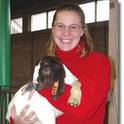The potential of cloning depends in part on whether the procedure can reverse cellular aging and restore somatic cells to a phenotypically youthful state. Here, we report the birth of six healthy cloned calves derived from populations of senescent donor somatic cells. Nuclear transfer extended the replicative life-span of senescent cells (zero to four population doublings remaining) to greater than 90 population doublings. Early population doubling level complementary DNA-1 (EPC-1, an age-dependent gene) expression in cells from the cloned animals was 3.5- to 5-fold higher than that in cells from age-matched (5 to 10 months old) controls. Southern blot and flow cytometric analyses indicated that the telomeres were also extended beyond those of newborn (<2 weeks>old) and age-matched control animals. The ability to regenerate animals and cells may have important implications for medicine and the study of mammalian aging.
Available at: http://works.bepress.com/nancy_malcuit/1/
